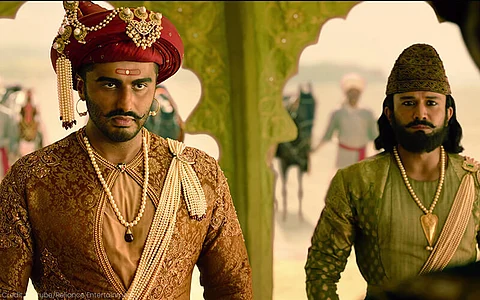Panipat Movie Review: A Briefly Enjoyable War Saga That Is Ineffectual If Not Intolerable
Director: Ashutosh Gowariker
Producer: Sunita Gowariker, Rohit Shelatkar
Music: Ajay-Atul
Cast: Arjun Kapoor, Sanjay Dutt, Kriti Sanon
Duration: 2 hours, 51 minutes.
Quentin Tarantino's middle-finger to history, Once Upon A Time In… Hollywood (2019) plays out like a slow burning simmer on which is perched, somewhat anachronistically, a climax that everyone was expecting. The movie, afterall, is based on historic events. The build-up was necessary; it needed to be and feel stretched, to give a sense of what is at stake.
Panipat follows a somewhat similar trajectory, but of course it isn't nearly as sophisticated, exciting, or enduring. (Panipat is 11 minutes longer too) The whole film is a lead up to the events of the Third Battle Of Panipat that took place in 1761.
The respective armies of Ahmad Shah Abdali, (played with Munnabhai menace by Sanjay Dutt) the founder of modern day Afghanistan, and Sadashiv Rao Bhau, (Arjun Kapoor in an agonizing, rehearsed performance) traverse the contours of North India, playing hide and seek on opposite banks of the Yamuna. The entire build-up is about the making and unmaking of alliances for the Grand Battle- a Gatbandhan, as one character calls it. The Gatbandhan frays then, as it would more than three centuries later, in an Indian heartland electoral battle.
There is lots of commentary about this film being the forsaken love child of Bajirao Mastani and Padmaavat. In the midst, we forgot Parvati, who is somewhat Kashibai, somewhat Mastani, emptied out of any complexity.
Someone is going to betray the Maratha Party- that the sub-head of the film "The Great Betrayal" makes clear. The Maharashtra elections just got over. The party of the Marathas, after a brief betrayal, and losing the battle, won the war. The Marathas, in the film too, despite having lost the battle, are said to, in the write up that emerges before the credits, have won the war. (Of course, the brouhaha happened much after this film was written and shot, so I am not saying it is intended, but merely thoughts to chew on over the elaborate runtime) The betrayal here doesn't even register. It is mentioned off-handedly in the chaos of the battlefield and the betrayer exits the scene.
The battle itself comes only in the last twenty minutes. (as opposed to a Baahubali: The Beginning (2015) whose entire second half was the battle) The film is a mere lead up; that is approximately 2 and a half hours of build-up. The fore-play wouldn't be this agonizing, and in fact I was quite invested in the goings on while watching it, if the climax were a bit more… coherent.
The war plays out without rules, there are guns, cannons, swords, and spears with pre-2010 wobbly CGI work, but when Arjun Kapoor is waxing eloquent on Maratha dharma or mourning verbosely on the battlefield, none of the opposing army seem to injure him. In the final sequence when Kapoor is surrounded by enemies, he keeps skewering men onto his spear, while the opposing army just stand with their swords. There's a lone gun lurking in the midst of people pummeling each other. There is no method to this madness. That is understandable given it is a war, people are running helter skelter. But for how long? The run time exceeded my patience.
The whole build up crashes at the altar of this disastrous climax. Kriti Sanon, playing Parvati, the wife of Sadashiv Rao Bhau, gazing into the battlefield is the only thing that moved me- that stray strand of hair on her face, bulging eyes, and an agile, vulnerable gait got me through the sheer cardboard purity of her lines. There is lots of commentary about this film being the forsaken love child of Bajirao Mastani and Padmaavat. In the midst, we forgot Parvati, who is somewhat Kashibai, somewhat Mastani, emptied out of any complexity.
If anything, during the film, I was contemplating the futility of war- men with egos out-sizing the pleats on their angrakhas, and the decibels on Ajay-Atul's background score, deciding what is and isn't worth going to war for, while thousands, if not million, ordinary men languish. The vultures gazing at the blood-addled battlefield stain this message darker. Who decides what is worth giving your life up for?
I would be remiss if I didn't note how Gowarikar has taken the trope of the evil, irredeemable Muslim despot and made him less evil, more redeemable. His only vice seems to be gluttony for power, and even that softens. There is more light in his dark courtroom as the film closes. Gowarikar has also added contrived messaging about togetherness, caste, class, and religion. (made even more contrived by Arjun Kapoor's delivery) But much like the film, these sermons are merely ineffectual, if not entirely intolerable.

